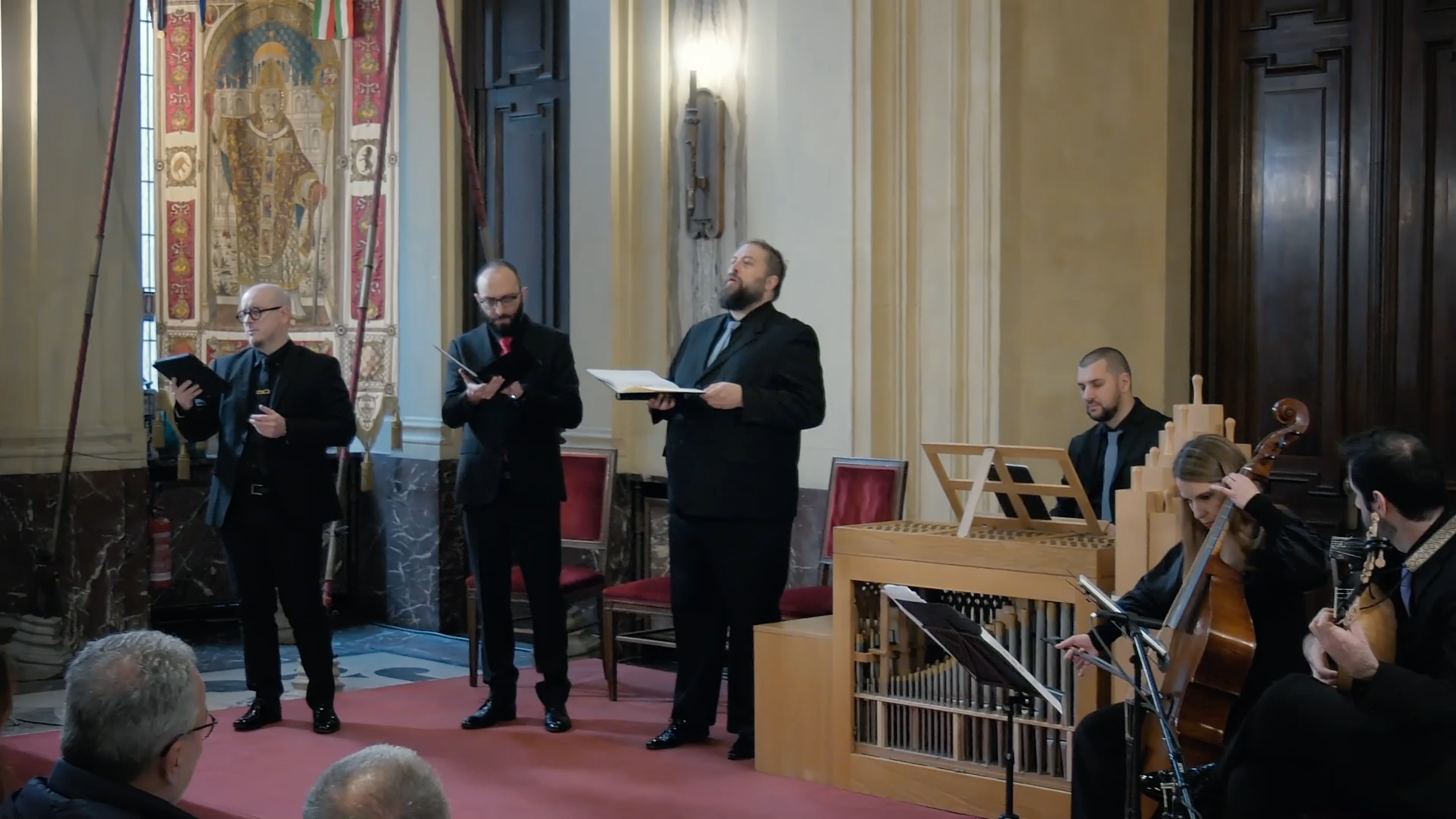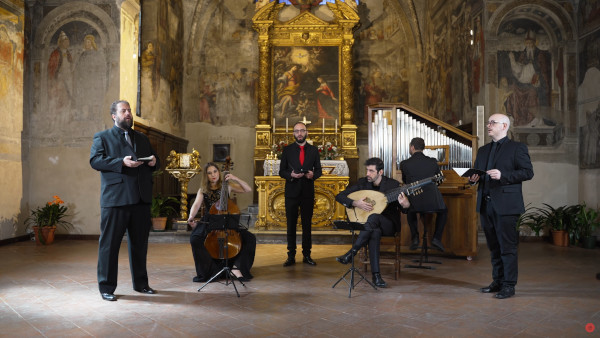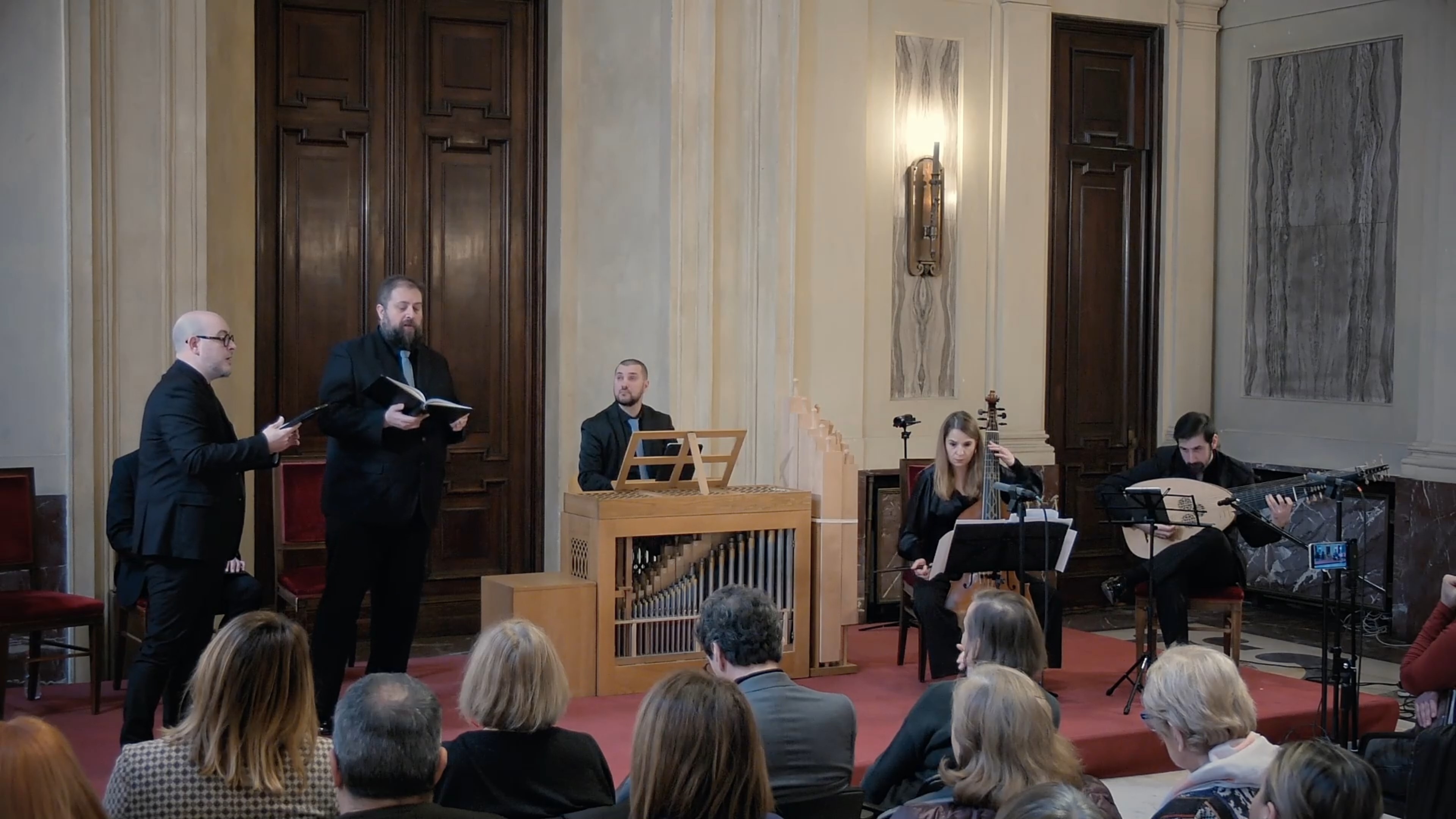I_DISINVOLTIearly_music_ensemble
Founded in 2018, I_DISINVOLTI is an early music ensemble whose main mission is the re-discovery of Italian unedited music, with a special focus on three male voices repertoire from XVII century Venice and surroundings, rarely practiced by other ensembles. Study and research of original prints are an essential part of the ensemble’s work, along with the transcription in modern notation: the ensemble performs solely on scores transcribed by the artistic director, Massimo Lombardi.
The ensembles’s debut album has been released in 2021, a «Vespro della Beata Vergine» by Giovanni Antonio Rigatti, recorded as world premiere in collaboration with UtFaSol Ensemble. The second group’s recording is titled «Vulnerasti cor meum» and is anthology of motets around the Song of Songs, released in 2024. Both recordings received excellent reviews from specialized critics (Gramophone, Toccata Magazine, Classica, Scherzo).
Each of the group members performed (with some of the most popular ensembles) in prestigious venues and festivals all around Europe, including Het Concertgebouw Amsterdam, Utrecht Oude Muziek Festival, Schwetzinger Festspiele, Tage Alter Musik Regensburg, Bruges Concertgebouw, Paris Philharmonie, Theater an der Wien, Kölner Philharmonie, Théâtre des Champs-Elysées, Innsbrucker Festwochen der alten Musik.
tenor_&_conductor
tenor
bass
viola_da_gamba_&_lirone
theorbo_&_baritone
organ_&_harpsichord
in_XVII_century
Placed inside a frame of five «Salve Regina» by Monteverdi, the cult of the Holy Mother is described through marian motets and antiphons by other composers, active in different cities of northern Italy during the first half of 17th century.
Just one of the four marian antiphons sung at Compline at different seasons during the liturgical year, «Salve Regina» has been the favorite and most set in music by the composers of the 17th century. This program develops inside a frame of five «Salve Regina» by Claudio MONTEVERDI: two for three male voices, one for two tenors and two for tenor solo.
Inside the area defined by these pieces, other marian devotional music by the most talented composers has been chosen for its analogy and contrast to Monteverdi's style: in the music of the venetian composers (Rovetta and Monferrato) his influence is quite clear and recognizable, not so much for the composers who have trained and have worked in other musical realities of the north of Italy (Modena, Bologna, Bergamo).
Music by Claudio Monteverdi, Giovanni Rovetta, Natale Monferrato, Giovanni Felice Sances, Ludovico Grossi da Viadana.
This program will be the third recording project of «I Disinvolti», planned for 2025.
ravished_my_heart
Anthological program around the Song of Songs. In addition to motets of Monteverdi, Grandi and Rovetta, authentic masterpieces by lesser-known composers are proposed, built around the most sensual of biblical texts.
Attributed to King Solomon but in all probability composed by an anonymous poet around the 4th century BC, the «Song of Songs» represents a remarkable peculiarity within the biblical corpus: it does not deal with Law, Knowledge or the relationship with the Divinity , but it is a sensual and passionate dialogue between two lovers. Many words were spent about the interpretation of this text pervaded by undeniably erotic metaphors and similes: for the Jews it is the allegory of the relationship between God and Israel, for the Christians it represents the love of Jesus for the Church, his bride.
But in the scope of sacred music this very singular text takes on a further meaning: the bride becomes the Holy Mother, who perfectly fits all those attributes that were previously intended for the beloved (pulchra, speciosa, columba, friend, sponsa). This is a very ancient custom: in the Liturgy of the Hours (inspired by the Rule of St. Benedict, dated 540) the antiphons for the Vespers dedicated to the Blessed Virgin are in fact taken from the text of the Song of Songs.
Music by Claudio Monteverdi, Alessandro Grandi, Giovanni Rovetta, Ignazio Donati, Giovanni Valentini, Orazio Tarditi, Francesco Casati, Giulio Cesare Monteverdi, Giovanni Bernardo Colombi, Leone Leoni, Serafino Patta.
This is the second recording project of «I Disinvolti» and is available on CD since March 2024 (see recordings)
blessed_virgin
[1643]
The Psalms and the Magnificat of Rigatti's 1643 collection offer the backbone of these Vespers for the Blessed Virgin. The program is completed by vocal and instrumental pieces of coeval composers (Banchieri, Usper, Patta, Del Buono, Milanuzzi) and by the proper gregorian chants for the Feast.
Considered by many musicologists as one of the most important composers of sacred Italian music from the first half of Seicento, Rigatti began his musical path as «puer cantor» in the choir of St. Mark in Venice, serving then as choirmaster in Udine's Cathedral from 1635 to 1637. Back in Venice, from 1639 he has been organ and music teacher for the young ladies of Ospedale dei Mendicanti and Ospedale degli Incurabili.
The backbone of this «Vespro della Beata Vergine» consists of a selection of Psalms and a Magnificat selected from the reprint - the first edition (1641 or 1642) is lost - of «Messa E Salmi Ariosi a Tre Voci Concertati, & parte Con li Ripieni à beneplacito» by Giovanni Antonio Rigatti, edited in Venice in 1643 by Bartolomeo Magni. The instrumentation of this collection is mainly for three male voices - two tenors and a bass - with basso continuo, to which is sometimes added an «ad libitum» four-voices choir, superseded in this case by a quartet of wind intruments (cornetto and three sackbuts), following the widespread custom in the XVII century of replacing missing voices with wind or string instruments with similar tessitura.
Vocal and instrumental pieces of other composers (Carlo Milanuzzi, Giovanni Battista Riccio, Francesco Usper, Adriano Banchieri, Serafino Patta, Gioanpietro Del Buono e Andrea Gabrieli) complete the liturgy of the Vespers, in addition to the proper gregorian chants.
Recorded as a world premiere in collaboration with UtFaSol Ensemble, this album has been released by Arcana (Outhere).
of_the_maestro
Claudio Monteverdi and his influence on his subordinates in St. Mark (Giovanni Rovetta and Alessandro Grandi), on his brother Giulio Cesare Monteverdi and on other Venetian composers active in the same period, Giovanni Antonio Rigatti and Giovanni Battista Riccio amongst the others.
Claudio Monteverdi has been a pivotal figure in the transitions from the «stile osservato», product of the Renaissance, to the new and daring style of «Seconda Prattica». But he was certainly not the only one to use the new expressive tools: a whole generation of young musicians came in contact with his music and has been formed under his guide at the St. Mark.
Monteverdi arrived in Venice in 1613, aged 46 and already an expert musician: the Vespers has been published three years before, the Sixth Book of Madrigals would have been printed during the following year. His predecessor Giulio Cesare Martinengo left the musical chapel in bad shape, but Monteverdi lifted if out of his condition: he reorganized the structure, bought new scores and hired new musicians, thus bringing it back to the level worthy of one of the most important musical centers in Europe.
From 1613 to 1643, year of his death, some of the best musicians gravitated around Monteverdi, over all Alessandro Grandi (vice-maestro from 1620 to 1627), Giovanni Rovetta (vice-maestro since 1627 and Maestro di Cappella after Monteverdi's death) and Giovanni Antonio Rigatti (since 1621 in St. Mark as a choirboy, from 1639 on has been employed in different Venetian «Ospedali»). Maybe not everybody knows that also Claudio's younger brother, Giulio Cesare Monteverdi, has been a talented composer and organist...
This program proposes an anthology for one to three voices, narrowly selected to underline common traits and peculiarities of Claudio Monteverdi, Giovanni Antonio Rigatti, Giovanni Rovetta, Alessandro Grandi, Giulio Cesare Monteverdi, Giovanni Battista Riccio.
ET_DOLCE_MORTE
and
sweet_death
Amorous yearnings and fatal abandons in a rich florilegium of concertato madrigals and canzonettas, selected within the output of Claudio Monteverdi, Giovanni Antonio Rigatti, Alessandro Grandi, Barbara Strozzi & others.
In 1619 Claudio Monteverdi sends to print his Seventh Book of Madrigals, whose title - «Concerto» - is an example of the compositional trend that developed between the 16th and 17th centuries, that is the birth of Basso Continuo. New expressive expedients, in addition to the use of concerted instruments, are explored in every possible form by Monteverdi and other valid composers all over the peninsula, finding however tenacious resistance in Rome, still too tied to Palestrina's polyphonic lesson to fully absorb the new stylistic wave.
Following the path marked by Monteverdi, this anthological program proposes madrigals for one, two and three voices by authors from various backgrounds but all active between the 1620s and 1640s. The aim is, in particular, to underline the oxymoronic relationship of Love and Death: cruel, painful, aching the former - sweet, liberating, releasing the latter.
Music by Claudio Monteverdi, Barbara Strozzi, Alessandro Grandi, Giovanni Rovetta, Giovanni Antonio Rigatti, Pietro Andrea Ziani.
contrada_mondovì_15 | cuneo
AMORE_SACRO_&_AMOR_PROFANO
MODULAZIONI_FESTIVAL
corso_palestro_14 | torino
CLAUDIO_MONTEVERDI
tra_sacro_e_profano
SEGNI_BAROCCHI_2022
via_allegri_2 | san_giovanni_profiamma [PG]
VULNERASTI_COR_MEUM
piazza_duomo | piacenza
VULNERASTI_COR_MEUM
motets_from_the_song_of_songs
VULNERASTI_COR_MEUM

giovanni_antonio_rigatti
VESPRO_DELLA_BEATA_VERGINE

Two young Italian ensembles join forces to revive a Vespers setting of the Venetian school dating from the year of Monteverdi’s death. Regarded by musicologists as one of the leading Italian composers of the early seventeenth century, Giovanni Antonio Rigatti pursued the major part of his musical career in Venice, in the shadow of the "divine Claudio".
The framework of this Vespro is taken from the 1643 collection Messa e Salmi ariosi a tre voci. The performing forces are unusual: three male voices and basso continuo, with an ad libitum choir of instruments (cornetto and three trombones). An agile, inventive and expressive setting of the Office of Vespers, which stylistically owes a great deal to Monteverdi’s Selva Morale e Spirituale, an undoubted source of inspiration for Rigatti. It contains thirteen unpublished pieces, here presented in their world premiere recording.
Error
O_QUAM_TU_PULCHRA_ES
primo_libro_de_motetti
venezia :: 1610
DIXIT_DOMINUS
messa_e_salmi_ariosi_a_3_voci
venezia :: 1643
+ utfasol_ensemble
SALVE_REGINA_III
salve_regine
venezia :: ca. 1662-1667
VULNERASTI_COR_MEUM
parnassus_musicus_ferdinandæus
venezia :: 1615
NISI_DOMINUS
messa_e_salmi_ariosi_a_3_voci
venezia :: 1643
PROVIDEBAM_DOMINUM
sacræ_et_divinæ_cantiones
venezia :: 1619
SALVE_REGINA
primo_parto_de_motetti_e_cantilene
venezia :: 1640
SALVE_REGINA_A_2
selva_morale_et_spirituale
venezia :: 1641
LAETATUS_SUM
messa_e_salmi_ariosi_a_3_voci
venezia :: 1643

































































